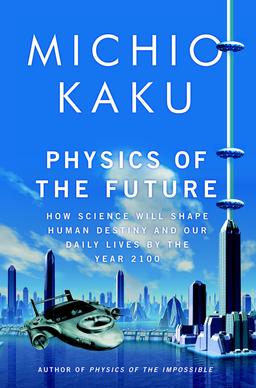Book Review: Physics of the Future
Physics of the Future:
How Science Will Shape Human Destiny and Our Daily Lives by the Year 2100
by Michio Kaku
Review by Brian Polk
In this book, world-renown theoretical physicist Michio Kaku interviews over three hundred of the world’s top scientists, lays out a fascinating template for what is to come in the world of science and technology, and imagines how these discoveries will inevitably intersect the world in which we live during the next one hundred years. While he is quick to point out the speculative nature of his assertions, Kaku backs them up with current knowledge combined with the rapid trajectory many ideas take, and the fact that the amazing inventions and advances he describes already exist in prototype form.
While Michio Kaku is a high-level academic and successful physicist who has established himself through his work on string field theory, he writes with an engaging and enlightening style that is easy to follow and accessible for both high school science teachers and their upper level students.
When I was a high school student, I remember watching Back to the Future 2 starring Michael J. Fox and Christopher Lloyd and dreaming of how the world might appear in 2015. My imagination ran wild, and my curiosity was peaked. This book created much the same effect on me. Space elevators! Internet-enabled contact lenses! Cars that fly on magnetic fields! This is not virtual reality but augmented reality.
As scientists, researchers, and experts share their visions of the future with Kaku, he outlines the ways in which the limits of the electronic computer are fast approaching. The microprocessor will soon be obsolete with nanotechnology forging ahead as optical mechanisms replace electronic ones, and the concept of a personal computer morphs into a tool even more valuable and versatile. Kaku describes flexible viewing screens made ubiquitous because of biological advancements so abundant and inexpensive that users are able to paint an entire wall and transform it into a media-viewing source. Other ideas introduced and highlighted include space tourism with a base on Earth’s moon, driverless cars, robot surgeons, and robots with emotions. In articulating his view about the future of medicine, the author touches on what it means to be human, and the significant need for deep ethical reflection and comprehensive, straightforward discussions about the human value of these potential life-changing innovations.
Kaku introduces each topic by connecting it to earlier scientific advances and/or to the philosophy of science. His writing style is personal and engaging, and his enthusiasm is contagious. After reading Physics of the Future, I wanted more and talked about it with everyone I met. In my eleventh grade physics class we spent two days discussing the innovations and their theological and ethical implications. My primary goal as a science teacher is to inspire passionate interest in science and stimulate awe, wonder, and curiosity for God’s creation. This book is an indispensable resource helping me to accomplish this goal. I highly recommend it.

